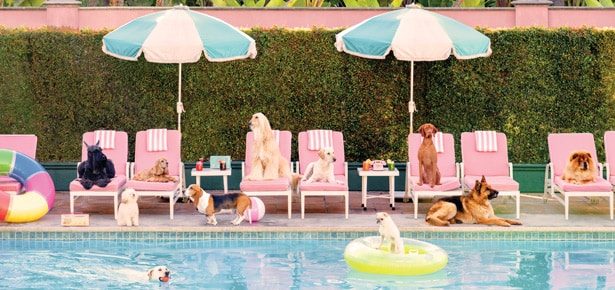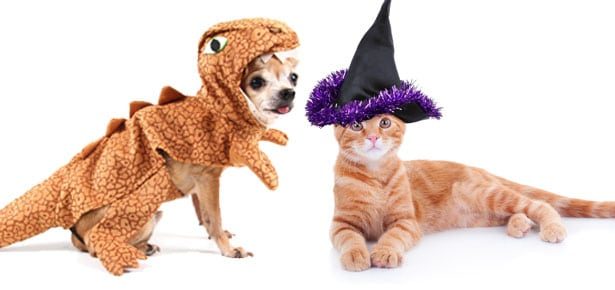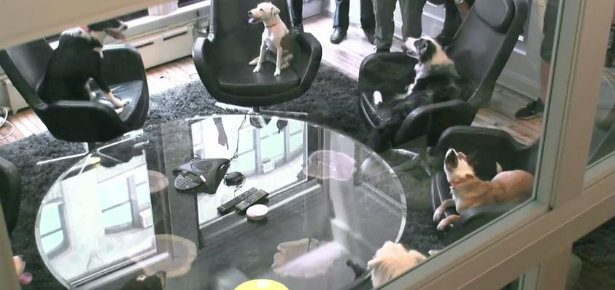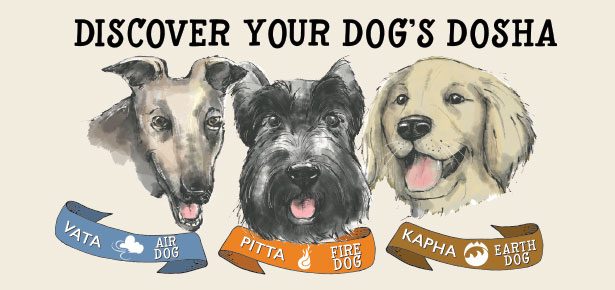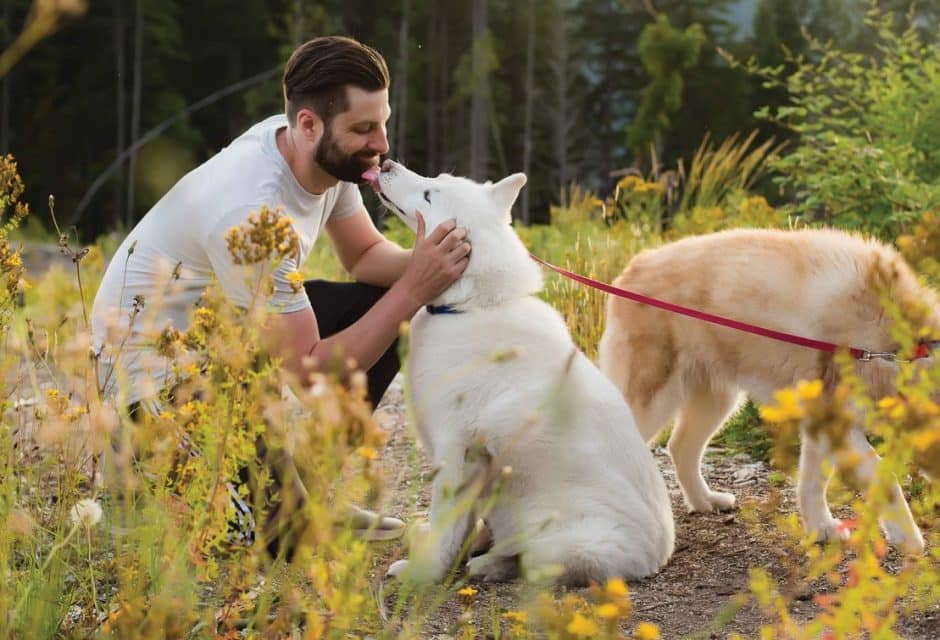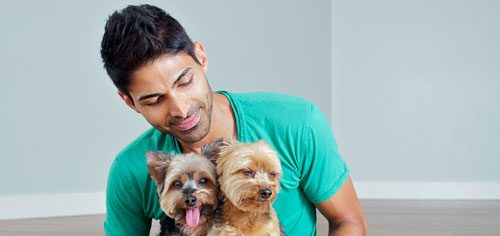
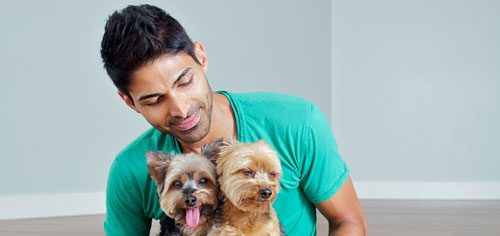
Zen and the Art of Doggieness
A yogi’s journey from darkness to light, and the angels who helped him get there
About a year ago, I hurt my foot training for the
Las Vegas marathon. A bummer, to be sure. After
three months of doing nothing but consuming
white carbohydrates (read: Chardonnay) and moping on the
couch watching Law and Order re-runs, my husband and
I decided to spend Christmas in Montego Bay, the land of
beautiful bikini-bearing tourists and beautiful geneticallyastounding
locals. Ahh, just the place for a person suffering
the ill-effects of over-consumption to feel even more bloated
and puffy. Thankfully, the all-inclusive nature of our resort
meant no shortage of champagne (read: more white carbs)
for Chad and I to toast new beginnings. Sure, we agreed, I
needed to take a break from running, but that didn’t mean I
couldn’t engage in something a little less hard on the joints.
Hadn’t I always admired (read: envied to the point of madness)
those nauseatingly sculpted contortionists with their
chiseled yoga backs? Yes, that’s it, we clinked our flutes, I
will become a yogi! Las Vegas, you can keep your silly marathon.
New to the community of Deep Cove, a seaside enclave
just 20 minutes from downtown Vancouver, I’d frequently
passed Maa Yoga on my way to and from meetings.
Unbeknownst to the Zen masters sitting in lotus position
behind the doors of this uber-chic studio, Maa would be
the chosen locale of my newfound quest; the Cheers to my
Norm. Which, it goes to say, would make its founder, yogi
Farhad Khan, the Sam Malone to my Cheers.
Like the character played by Ted Danson in the sitcom
classic, so too is Khan indisputably welcoming and indisputably
attractive. But the similarities between the two
end there. While Khan possesses the physical attributes of
someone who makes a living folding his body into poses that
leave him resembling a human piece of installation art—trust
me, I’ve seen this man in “crow”—it’s his eyes that give him
away. Darker than charcoal, they provide a sense they have
seen things that lead a person to a deeper level of understanding
and compassion, disclosing a rare combination of
sweetness and survival. But the eyes only hold you for so
long. After all, flanking their dad behind the counter are Rokko
and Koko, his Yorkie-Havanese canine co-workers. “I share custody
with my sister,” he laughs. “We each get them for ten days
at a time.” As enchanting as Khan and his sidekicks are—the
gentle and approachable Rokko and Koko serving as evidence
that dogs are frequently a reflection of their owners—his isn’t
just a story of a nice guy who takes his dogs to the office. No,
his is a story of an appreciation for animals that blossomed from
the mire of family tragedy.
“I honestly believe that dogs are my angels,” he tells me. “It’s
not lost on me that ‘dog’ is ‘God’ backwards.”
After his father was convicted of the 1993 murder of his sisterin-
law, life for the then-teenaged Khan entered a period of great
struggle. “I was lost,” he recalls. “It was a time of tremendous
darkness.” The mood changes ever so slightly when he tells
me who helped him get through the days following his father’s
incarceration.
“Aboo, our family dog, was our saving grace. He kept our
foundation intact. He was the light our family needed in a dark
time.” As he speaks, I’m reminded that while I typically hear
stories of people who have rescued the family dog, this is a story
about a family dog who rescued his people.
“When Aboo passed away, it was like we lost the family baby,
after everything he’d helped us through. A month after, I couldn’t
take it anymore. I went looking for the new family baby. And
that’s when I found Koko and Rokko.”
Unlike my own yogic journey which saw me come to the mat
to access muscle, Khan’s saw him come to the mat to access spirituality.
“It was an instant connection,” he remembers of his first yoga
class. “I began to realize that, through my adversity, I had gained
strength. I was gifted this experience for a reason. It was transformational.
Like a lotus flower out of the mud, something beautiful
was appearing.”
Less than five years after opening, Khan’s studio offers approximately
2,000 students about 60 classes a week led by some of the
area’s most skilled yoga practitioners. Maa, he explains, is the
Hindi word for “mother” and the studio itself is as a testament to
maternal care in the figurative and the literal sense.
“Maa is my tribute to my mother. She’s a very strong woman.
And we all need to learn to mother ourselves. When we take care
of ourselves, we are better able to take care of the people—and the
animals—in our lives.”
Based on being acutely mindful and treating all living beings
with respect, Khan’s lifestyle philosophy is a symbiotic merging of
both yogic and dog-loving values.
“Gandhi said that the moral progress of a nation can be judged
by the way its animals are treated and I believe that. My relationships
with Aboo and Rokko and Koko are an important part of the
bigger picture. Dogs teach you to let go of whatever it is you’re
hanging on to. And the same can be said for yoga.”
Talking to Khan, I recognize what the eyes have been trying
to tell me all along. There is joy where there was once sadness.
There is love where there was once loss. There is light where there
was once darkness. Be it a fractured foot, a fractured heart, or a
fractured sense of self, at one time or another, we will all find ourselves
in the dirt. But with a little help from our angels—on two
legs or four—we each have the power to make like a lotus and
blossom. After all, that’s what Farhad Khan did.
Join the newsletter and never miss out on dog content again!
"*" indicates required fields
By clicking the arrow, you agree to our web Terms of Use and Privacy & Cookie Policy. Easy unsubscribe links are provided in every email.
